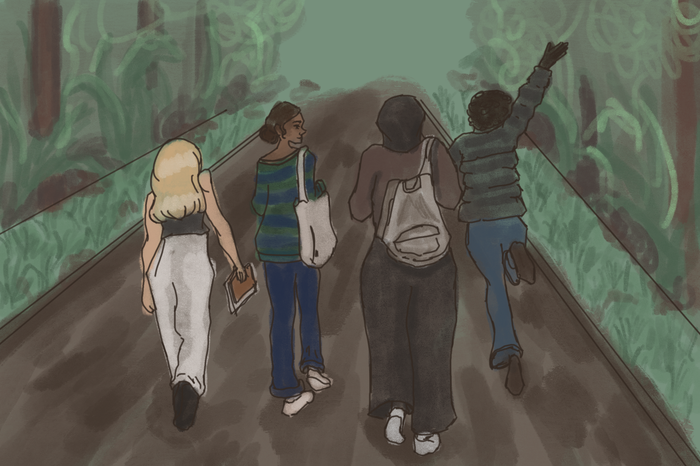Have we become too open about our mental health?
Daisy Stewart Henderson argues that we must not forget the privilege and politicisation associated with emotional openness

Not infrequently, Gen Z seems to astound our elders with the amount that we are willing to share. A reported 87% of Gen Z feel comfortable having discussions about mental health with others, while a third have posted about their mental health on social media. A generational shift towards transparency has undoubtedly occurred.
Yet, in making the assumption that almost all young people are comfortable asking for help with their mental health, we risk focusing on a vocal minority while neglecting those prone to suffering in silence. It is well-established that certain groups - men, for example - are less likely to reach out for support, but this hesitancy can befall anyone. For all the merits of openness, it must not come at the cost of sensitivity. We must remember that, even among Gen Z, wearing your heart on your sleeve is often no mean feat.
"We must remember that, even among Gen Z, wearing your heart on your sleeve is often no mean feat"
Gen Z’s openness has contributed to the destigmatisation of professional mental health support among the young. In some circles, therapy appointments are mentioned as casually as any mundane errand, or even advertised with a certain degree of pride. But, this relaxedness cannot be taken as representative of all young people, and has taken on certain political connotations. While a lingering sense of shame or a not-unreasonable preference for privacy may prevent some from attending or discussing mental health services, there is a far more practical reason why even the gentlest conversations surrounding them risk a degree of exclusion: therapy is both expensive and difficult to access.
NHS England aims for 95% of patients to receive a first appointment of talking therapy within eighteen weeks of referral. In contrast, the average waiting time for an appointment with Cambridge’s University Counselling Service was just three days in 2024. Though no longer the mysterious preserve of movie stars, in many ways therapy remains a luxury. All too often, a young person’s ability to access it is contingent on having the good fortune to be a part of a family or institution willing and able to provide it privately. While open conversations about accessing mental health support are undoubtedly beneficial, we would do well to consider that the same options are not available to everyone as we conduct them. Faced with the vicious pairing of two-tiered mental health services and their politicised glamourisation, therapy risks becoming a fashionable but exclusive commodity among Gen Z.
"Though no longer the mysterious preserve of movie stars, in many ways therapy remains a luxury"
Really, all we need is a degree of common sense, in addition to basic empathy. The destigmatisation of discussions around mental health are welcome, and any mature person should be perceptive enough to recognise that though someone may not express their unhappiness verbally, or indeed show it much at all, all is not necessarily well.
The stumbling block that arises here is social media, and the havoc it wrecks on nuance. Remember the third of young people who have posted content about their mental health on social media? Though they are in no way to blame for turning to this all-too-accessible medium as an outlet for their anguish, its utilisation in this way becomes an extremely public demonstration of suffering that I fear does more harm than good. To put it crudely, misery does love company, and social media promotes this. When a person’s cries for help become depersonalised pieces of content to be gaped at alongside some acquaintance’s holiday photos and cat videos, openness risks becoming spectacle rather than an enabler of support.
Openness around your personal struggles can often be helpful. But, there is no one correct solution to these issues. Years of chipping away at entrenched stigma has altered the perception of discussing your mental health as a strength rather than a weakness. The kindness and banishment of judgement that was integral to this shift must be extended to emphasise that an unwillingness to do so is not the antagonist of this. It is not consequently a failing. A recent study conducted by this university found that volunteers were happier when they suppressed negative thoughts as opposed to discussing them. Given that I’m remarkably unstoic, this probably won’t be my strategy the next time I’m feeling down. But if a stiff upper lip is the answer for some, this is a no less worthy solution than the most heartfelt of conversations.
What matters is the liberty to choose free of judgement, to navigate what remains a profoundly individual matter by yourself and to get through each bad day as best as you can, even if this looks different each time. And with this liberty must come sensitivity to the fact that Gen Z’s fabled openness may be less widespread than we think.
Want to share your thoughts on this article? Send us a letter to letters@varsity.co.uk or by using this form.
 Lifestyle / The woes of intercollegiate friendships8 May 2025
Lifestyle / The woes of intercollegiate friendships8 May 2025 Lifestyle / A beginners’ guide to C-Sunday1 May 2025
Lifestyle / A beginners’ guide to C-Sunday1 May 2025 News / Angela Rayner could intervene to stop Trinity ‘mothballing’ planned affordable homes site7 May 2025
News / Angela Rayner could intervene to stop Trinity ‘mothballing’ planned affordable homes site7 May 2025 News / Graduating Cambridge student interrupts ceremony with pro-Palestine speech3 May 2025
News / Graduating Cambridge student interrupts ceremony with pro-Palestine speech3 May 2025 Features / The quiet saboteur: when misogyny comes from within7 May 2025
Features / The quiet saboteur: when misogyny comes from within7 May 2025






